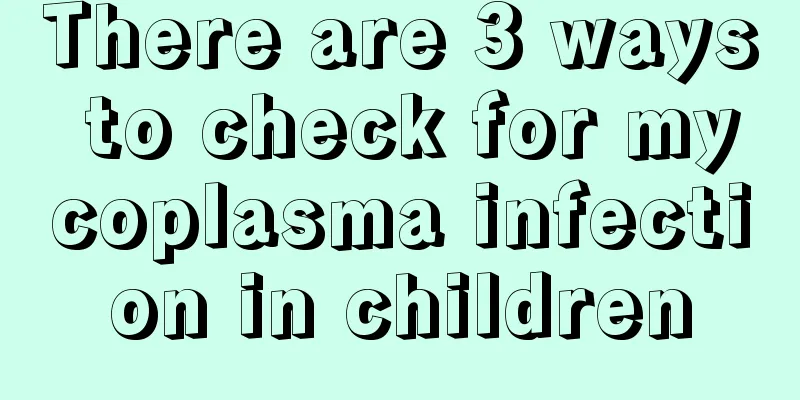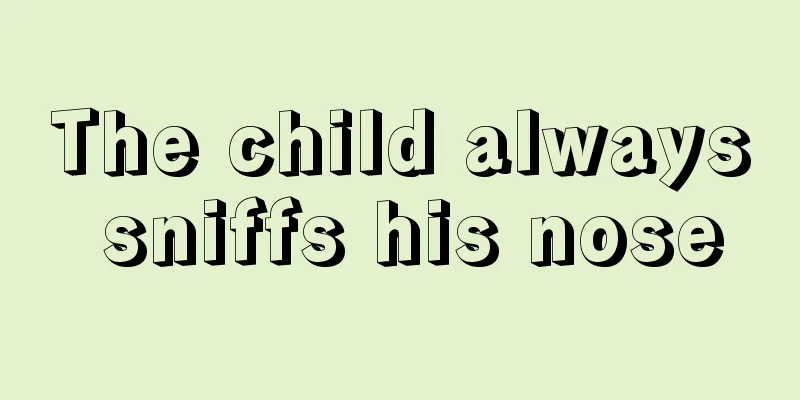How long does it usually take for babies to grow teeth?

|
Nowadays, parents are particularly concerned about when their baby will start to grow teeth, and they want to have a comprehensive understanding of it. Because when the baby is growing teeth, it is particularly important to supplement nutrition. Therefore, many parents want to have a comprehensive understanding of how long it usually takes for the baby to grow teeth. A detailed introduction is given below so that you can have a comprehensive understanding. The time of teething for babies varies. The earliest deciduous teeth begin to erupt at 4 months, but most babies start to grow teeth after 6 months. Teeth usually grow in pairs. The lower incisors (front teeth) appear first, followed by the upper incisors, then the lateral incisors, then the premolars and canines, and finally the molars. Generally, all 20 deciduous teeth will appear by the age of 3. However, each baby's growth is different. Some babies may grow teeth when they are four or five months old, while others may not grow teeth until they are one year old. As long as they grow teeth before one year old, it is normal. During the teething period, your baby will show many symptoms, such as irritability, drooling, and even biting everywhere, which are all discomforts caused by teething. Although these discomforts will gradually disappear as the teeth grow, they have a great impact on the growth of baby teeth. If they are not properly cared for, they may even affect the health of permanent teeth. Therefore, when the baby grows the first tooth, you should take the baby to the dentist to establish a His files record the growth of his teeth in detail. Teething order The birth of a baby's 20 deciduous teeth follows a certain order. Although it may not be set in stone, it can be used as a reference. 1. Lower deciduous central incisor 2. Upper deciduous central incisor 3. Upper deciduous lateral incisor 4. Lower deciduous lateral incisor 5. Lower first deciduous molar 6. Upper first deciduous molar 7. Lower deciduous canines 8. Upper deciduous canines 9. Lower second deciduous molar 10. Upper second deciduous molar Discomfort during teething Drooling Drooling a lot and often making the mouth and face wet is probably a common scene for every baby in the teething period. As the first tooth erupts, the gingival nerves are stimulated, causing increased secretion of the salivary glands. In addition, the baby's swallowing function is not yet perfect, so the secreted saliva can only flow out naturally. It is normal for babies to drool. Don't worry too much. When the baby is about one year old, the drooling will gradually disappear as the depth of the oral cavity increases and the swallowing function improves. However, care during this period is still essential. The above content has given a detailed and specific introduction to many parents on how long it usually takes for a baby to grow teeth. As a parent, do you want to know when your child will grow teeth? You must have a comprehensive understanding of the above content, and then make preparations in all aspects. When your child grows teeth, you can supplement nutrition and provide adequate care in all aspects to make your baby's teeth healthier. |
<<: Common ways to deal with a nine-month-old baby having a fever of 38 degrees
>>: What are the symptoms of small blisters on the baby's face
Recommend
What are the best treatments for cerebral palsy in children?
Cerebral palsy in children is a very common disea...
What are the benefits of swimming for newborns?
Many parents like to let their newborns go swimmi...
How to deal with baby's fever and stomach pain
Baby fever is a relatively common condition, and ...
Introduction to viral herpes
Speaking of herpes, I believe we are all familiar...
What can umbilical cord blood sampling reveal?
Umbilical cord blood puncture is a painless exami...
What should I do if my newborn baby has not defecated for 2 days?
I believe that the problem of newborn defecation ...
Is it harmful for children to wash their noses?
Children's health is the biggest concern of p...
Child coughing and wheezing
Some parents may find that their children often c...
Acne on the child's face
Many people think that only boys and girls enteri...
Newborn baby gasping and snoring
When a baby is born, it will bring a lot of joy t...
What should I do if my baby has a low-grade fever for several days?
It is quite common for babies to have a fever. If...
What to do if a child has rubella? Experts introduce effective treatments!
Very young infants and young children have very p...
Treatment of peeling feet in children
In fact, the situation of foot peeling should be ...
What to do if the boy's urethra is red and swollen
Children's resistance in all aspects is relat...
How to treat a one-year-old baby's cold
Colds are caused by mutated viruses and are chara...









